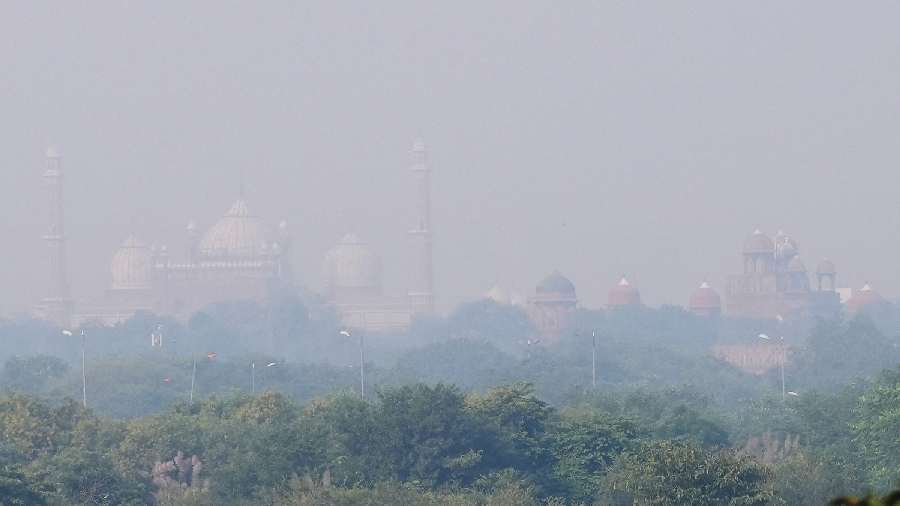


As Diwali celebrations come to a close, Delhi residents wake up to poor air quality with an AQI of 361 in the "very poor" category. Despite a ban on firecrackers, reports reveal widespread violations in both east and west Delhi. The city saw a significant increase in air and noise pollution compared to last year, largely attributed to unfavorable weather conditions, stubble burning, and vehicular emissions. The Delhi Fire Services received 78 calls regarding fire incidents on Diwali evening, with two people injured in a bus fire caused by firecrackers.
Delhi's Diwali: AQI in "Very Poor" Range, Despite Firecracker Ban
As the festive fervor of Diwali subsided, Delhi residents awoke to a bleak air quality scenario, with the Air Quality Index (AQI) hovering around 361 on Saturday, falling under the "very poor" category.
Background
Diwali, the festival of lights, is synonymous with the burning of firecrackers, a practice that has been linked to severe air pollution in Delhi in the past. Recognizing the adverse health impacts, the city government had imposed a blanket ban on the sale and use of firecrackers this year.
Violations and Consequences
However, despite the ban, widespread violations were reported throughout the city, particularly in east and west Delhi. Visuals captured on social media showed people brazenly bursting firecrackers, contributing to a substantial increase in air and noise pollution levels.
Weather Conditions and Contributing Factors
Unfavorable weather conditions, including low wind speeds and a stable atmosphere, exacerbated the impact of firecracker emissions. Additionally, stubble burning in neighboring states and increased vehicular emissions further contributed to the poor air quality.
Emergency Response
The Delhi Fire Services reported receiving 78 calls regarding fire incidents on Diwali evening. Of these, two people were injured when a bus caught fire due to firecrackers.
FAQs
Why is Delhi's air quality so poor after Diwali?
What are the health effects of poor air quality?
What measures can be taken to improve air quality?
How did Delhi's air quality compare to previous years?
What is the long-term impact of air pollution on Delhi's residents?
Conclusion
Despite the imposed firecracker ban, Delhi's air quality has severely deteriorated in the aftermath of Diwali celebrations. The widespread violations of the ban combined with unfavorable weather conditions have created a public health hazard. It is imperative that strict measures are implemented to curb air pollution and safeguard the health of Delhi's residents.

As festivities for Chhath Puja 2025 begin, schools in the national capital Delhi, as well as in Bihar, Uttar Pradesh, and Jharkhand, have announced closures on October 27, with additional holiday time for those in Bihar. In West Bengal, schools will be closed on October 31 for another significant festival, Jagadhatri Puja. With official announcements expected soon, students can look forward to enjoying the celebrations with their families.

The Hyderabad District Collector, Hari Chandana IAS, has launched India's first QR code-based feedback system at the Collectorate, marking a major step towards transparent and people-centric governance. This innovative system allows citizens to easily provide feedback, suggestions, and grievances in real-time, without the need for formal paperwork or technical skills. Along with promoting administrative efficiency and accountability, this initiative also promotes citizen participation and empowerment by enabling them to directly influence government operations at the local level.

Piyush Pandey, one of the most influential minds in Indian advertising, passed away on Thursday at the age of 70. Renowned for his iconic moustache and love for everyday stories, Pandey reshaped the industry by incorporating Hindi and Indian expressions, bringing humor, heart, and authenticity to mainstream brand communication. Indian Prime Minister Narendra Modi and Finance Minister Nirmala Sitharaman expressed their grief over the loss of Pandey, who was credited with revolutionizing Indian advertising and communication. His work will continue to inspire generations to come.

A private bus carrying 41 passengers caught fire after colliding with a motorcycle on National Highway 44 in Kurnool district, Andhra Pradesh. Preliminary police investigations suggest that the motorcycle's fuel tank ruptured and leaked fuel, causing the fire. The bus was reported to have multiple challans for traffic violations, and investigations are ongoing to determine the exact cause of the accident.

The Madhya Pradesh Police has launched a new campaign called 'Nashe Se Doori Hai Zaroori' to create awareness among the youth about the dangers of drugs and addiction. The campaign, which is being led by Indian Navy Chief Admiral Dinesh Kumar Tripathi, aims to highlight the importance of keeping the young generation drug-free in order to safeguard the country's future. Tripathi has urged everyone to understand their responsibility in creating a better India and to stay away from the path of destruction that substance abuse can lead to.

Studies have shown that surrounding yourself with greenery has significant benefits for mental health, including lower stress levels and improved mood. Engaging with indoor plants has been linked to reduced blood pressure and improved relaxation. A 2023 study also revealed that caring for indoor plants can increase mental well-being and emotional balance. Discover the top 12 indoor plants that can improve your health, happiness, and indoor air quality.

Devotees from all over India flocked to Vishram Ghat in Mathura to participate in the annual Bhai Dooj festival, a celebration of the special bond between brothers and sisters. The ancient Yamraj Temple was the center of the festivities as devotees took a dip in the holy Yamuna River and performed rituals to honor Yamraj and Goddess Yamuna. The festival is believed to bring blessings of long life, happiness, and prosperity to siblings and is a symbol of love and protection in Hindu mythology.

On the auspicious occasion of Bhai Dooj, Prime Minister Narendra Modi, Union Home Minister Amit Shah, and Union Health Minister JP Nadda extended their heartfelt wishes to the nation, celebrating the sacred bond between brothers and sisters. This festival, also known as Bhaiya Dooj, Bhai Tika, or Bhau Beej, is widely celebrated across India with love and festivity, symbolizing the unbreakable affection and dedication between siblings. The day holds great significance in Hindu mythology and is associated with the liberation of all living beings from suffering and the bestowal of happiness.

On Wednesday, April 30, Hindus will celebrate the auspicious festival of Akshay Tritiya, also known as Akha Teej. This day is believed to bring luck and success, and is considered free from all malefic effects. People often buy gold on this day as it is believed to bring prosperity and wealth in the future. Akshay Tritiya is also considered to be ruled by Lord Vishnu, who is a revered deity in Hinduism. The best time to buy gold on this day is between 06:11 AM and 02:12 PM, according to Drik Panchang.

As Diwali comes to a close, the festival of Bhai Dooj celebrates the unconditional love and bond between brothers and sisters with various names across India. This year, Bhai Dooj falls on October 23, with the tilak ceremony auspicious time from 1:14 PM to 3:29 PM. It is a time to cherish the cherished memories and create stronger relationships between siblings. Share heartfelt wishes and blessings on this day to celebrate the beautiful bond of love and togetherness.